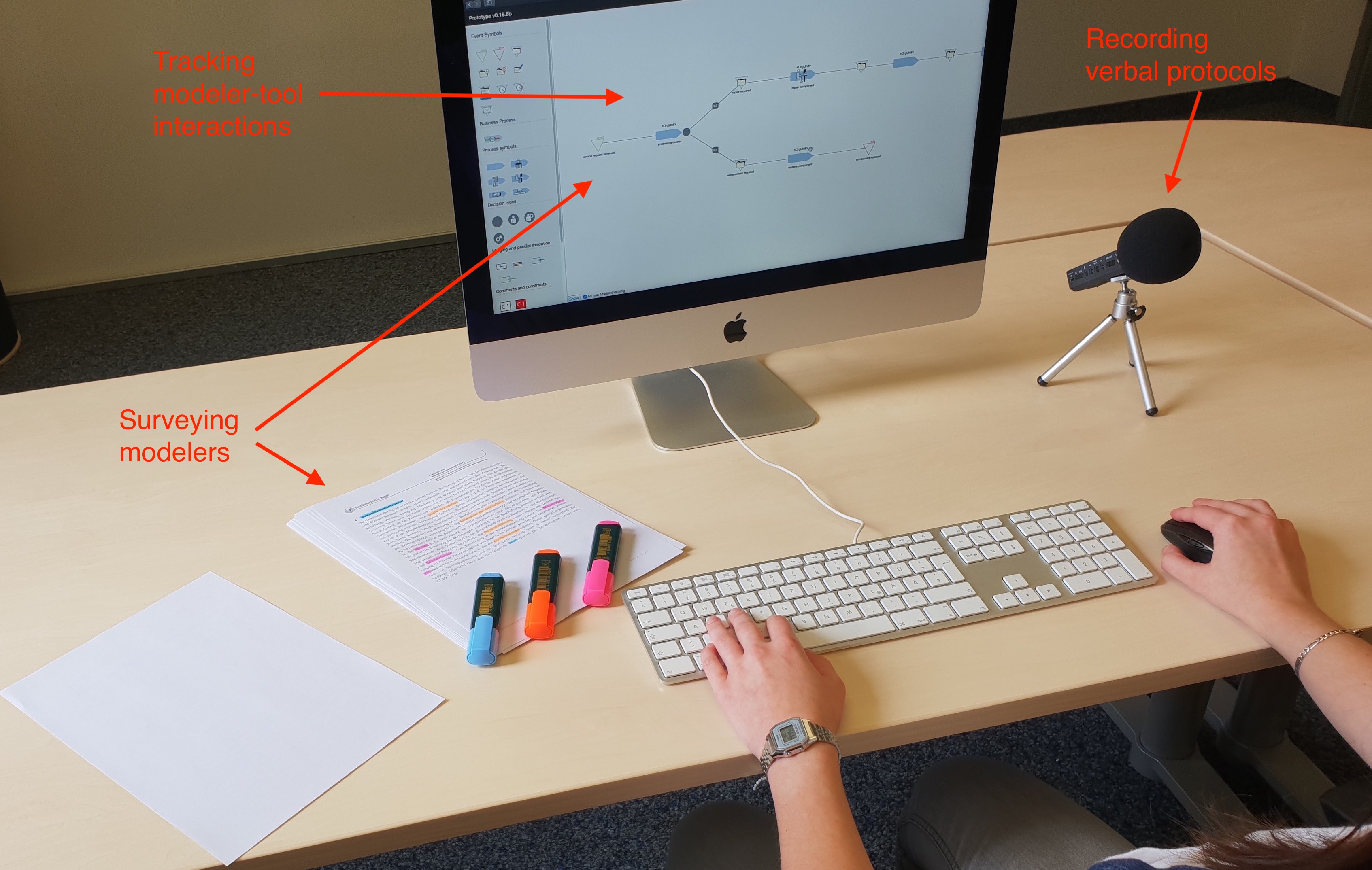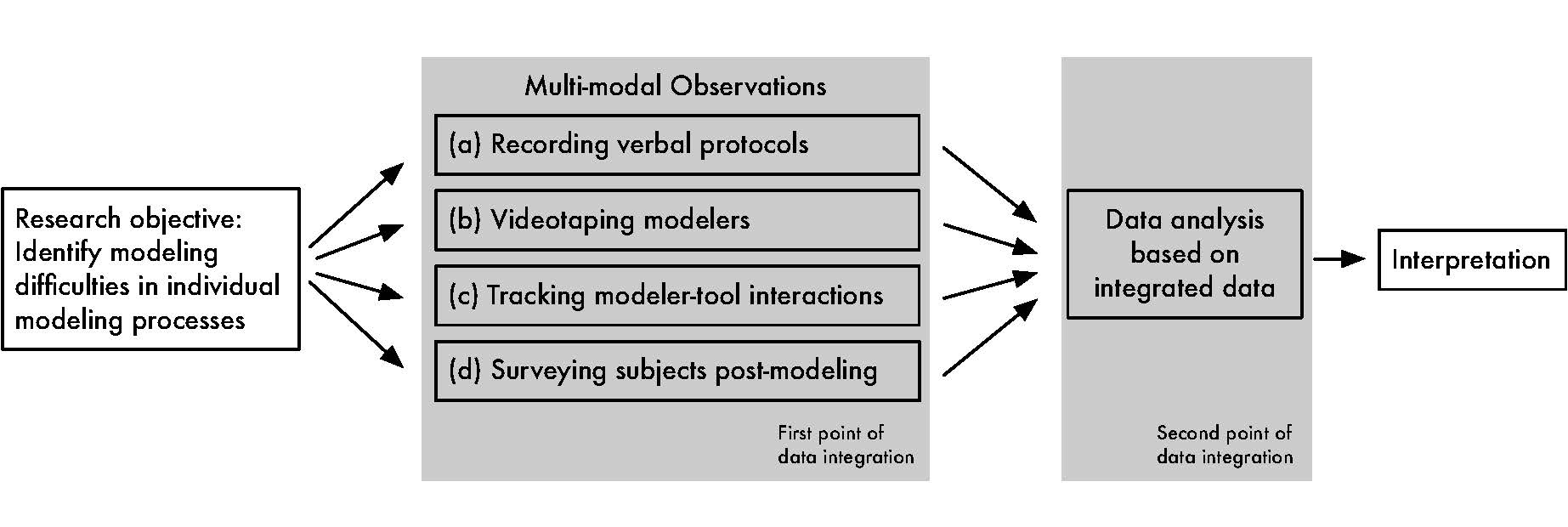Research Project
IMP – Individual Modeling Processes: Understanding modeling difficulties and designing tailored support for modelers
- Projektleitung:
- Prof. Dr. Stefan Strecker
- Mitarbeitende:
-
Sven Christ, M.Sc.
Philip Winkler, M.Sc. - Status:
- laufend
- Projektbeteiligte:
- Prof. Dr. Kristina Rosenthal
Nehmen Sie an unseren Studien zur konzeptuellen Modellierung teil!
Nehmen Sie an unseren laufenden Studien zu Modellierungsprozessen konzeptuellen Modellierens teil - wir suchen Studienteilnehmerinnen und -teilnehmer für Online-Studien (virtuell per Zoom) und für Präsenzstudien. Wir freuen uns über Ihr Interesse – kontaktieren Sie uns unverbindlich per E-Mail: tool
Research statement
Conceptual modeling as an activity involves an intricate array of cognitive processes and performed actions including abstracting, conceptualizing, contextualizing, associating, visualizing, interpreting & sense-making, judging & evaluating, and, in group settings, communicating, discussing and agreeing. Conceptual modeling and its learning are, hence, construed as complex tasks accompanied by challenges and difficulties specific to conceptual modeling.
Despite its importance and complexity, the process (or ‘act’) of conceptual modeling has received only limited attention in research so far. A recent literature review suggests that systematic knowledge about constructing conceptual models and learning processes of conceptual modeling is scarce (Rosenthal, Ternes & Strecker 2019). How conceptual modeling is performed by modelers, how modeling processes proceed, which modeling challenges and difficulties modelers experience and why, and how to overcome these difficulties by tailored modeling support has been subject to only a few studies.
The research project aims to contribute to a richer and more complete understanding of individual modeling processes by identifying modeling difficulties and by developing a taxonomic theory of such difficulties (cf. Rosenthal & Strecker 2019) – as theoretical foundation for designing tailored (software tool) support for modelers at different stages of their mastering of conceptual modeling. For studying individual modeling processes, we follow a mixed methods research design based on a multi-modal observation approach integrating complementary modes of observation of modelers’ modeling processes, including recording verbal protocols following the think aloud method, video recording of modelers from an ‘over-the-shoulder’ perspective, tracking modeler-tool interactions and surveying modelers (Rosenthal, Ternes & Strecker 2020). Observing and analyzing modeling processes is supported by TOOL, a web-based modeling tool integrated with a modeling observatory for studying modeling processes that has been developed in the Enterprise Modelling Research Group since 2013 (see research project TOOL).
We are looking for students who are interested in writing their bachelor’s or master’s thesis in this research project (see Abschlussarbeitsthemen, in German).
 Photo: (c) FernUniversität in Hagen
Photo: (c) FernUniversität in Hagen
 Photo: (c) FernUniversität in Hagen
Photo: (c) FernUniversität in Hagen
Publications
- Rosenthal K; Strecker S; Snoeck M: Modeling difficulties in creating conceptual data models: Multimodal studies on individual modeling processes, in International Journal on Software and Systems Modeling, 2022, DOI 10.1007/s10270-022-01051-8
- Rosenthal K; Wagner J; Strecker S: Modeling styles in conceptual data modeling: Reflecting observations in a series of multimodal studies, in Proceedings of the 30th European Conference on Information Systems (ECIS 2022), Timisoara, Romania, Research Paper 73.
- Ternes B; Rosenthal K; Strecker S: Automated Assistance for Data Modelers: A Heuristics-based Natural Language Processing Approach, in Proceedings of the 29th European Conference on Information Systems (ECIS 2021), Research paper 148.
- Ternes B; Rosenthal K; Strecker S: Automated Assistance for Data Modelers combining Natural Language Processing and Data Modeling Heuristics: A Prototype Demonstration, in Proceedings of the ER Demos and Posters Track co-located with 40th International Conference on Conceptual Modeling (ER 2021), St. John's, NL, Canada, October 18–21, 2021.
- Strecker S; Rosenthal K; Ternes B: Studying Conceptual Modeling Processes: A Modeling Tool, Research Observatory and Multi-Modal Observation Setup, in Gimpel H, Krämer J, Neumann D, Pfeiffer J, Seifert S, Teubner T, Veit D, Weidlich A (Eds.) Market Engineering – Insights from Two Decades of Research. Springer, Berlin. Anthology in Honor of Christof Weinhardt’s 60th Birthday, pp. 99–112, 2021.
- Rosenthal K; Strecker S: Toward a Taxonomy of Modeling Difficulties: A Multimodal Study on Individual Modeling Processes (Extended Abstract), in 11th International Workshop on Enterprise Modeling and Information Systems Architectures, EMISA 2021. Kiel University, Kiel, Germany, May 20–21, 2021. To appear in EMISA Forum.
- Rosenthal K; Strecker S; Pastor O: Modeling difficulties in data modeling: Similarities and differences between experienced and non-experienced modelers, in 39th International Conference on Conceptual Modeling, ER 2020, TU Wien, Vienna, Austria, Nov 3–6, 2020, pp. 501–511.
- Ternes B; Rosenthal K; Strecker S; Bartels J: TOOL–A Modeling Observatory & Tool for Studying Individual Modeling Processes, in Demo Track at the 39th International Conference on Conceptual Modeling, ER 2020, TU Wien, Vienna, Austria, Nov 3–6, 2020.
- Rosenthal K; Strecker S: Shaping the digital transformation: Mixed methods research based on multi-modal observations of individual modeling processes (Abstract+Poster), in 82. Jahrestagung des VHB zum Thema »Digitale Transformation«, Abstract-Band, Goethe-Universität, Frankfurt am Main, Germany, March 17-20, 2020, pp. 139–141.
- Ternes B; Rosenthal K; Barth H; Strecker S: TOOL–A Modeling Obervatory & Tool: An Update, in Joint Proceedings of Modellierung 2020 Short, Workshop and Tools & Demo Papers, Vienna, Austria, February 19–21, 2020, CEUR-WS, Vol. 2542, pp. 198-202.
- Rosenthal K; Ternes B; Strecker S: Understanding individual processes of conceptual modeling: A multi-modal observation and data generation approach, in Modellierung 2020, Vienna, Austria, February 19–21, 2020, pp. 77–92.
-
Rosenthal K; Strecker S: Toward a Taxonomy of Modeling Difficulties: A Multi-Modal Study on Individual Modeling Processes, in Proceedings of the 40th International Conference on Information Systems (ICIS 2019), Munich, Germany, December 15–18, 2019.
-
Rosenthal K; Ternes B; Strecker S: Learning Conceptual Modeling: Structuring Overview, Research Themes and Paths for Future Research, in Proceedings of the 27th European Conference on Information Systems (ECIS 2019), Track »Modelling and Managing the Digital Enterprise and its Business Processes«, Stockholm, Sweden, June 8–14, 2019, Research Paper 137.
-
Ternes B; Strecker S; Rosenthal K; Barth H: A browser-based modeling tool for studying the learning of conceptual modeling based on a multi-modal data collection approach, in Proceedings of the 14th International Conference on Wirtschaftsinformatik, Siegen, Germany, February 24–27, 2019, S. 1998–2002.
-
Ternes B; Strecker S: A web-based modeling tool for studying the learning of conceptual modeling, in Schaefer I, Karagiannis D, Vogelsang A, Méndez D, Seidl C (Hrsg.) Modellierung 2018, Braunschweig, Gesellschaft für Informatik e.V., S. 325-328, 2018.
Talks
-
Rosenthal K: Modeling styles in conceptual data modeling: Reflecting observations in a series of multimodal studies. 30th European Conference on Information Systems (ECIS 2022), Timisoara, Romania, 23.06.2022.
-
Rosenthal K: Modeling difficulties in data modeling: Similarities and differences between experienced and non-experienced modelers. 39th International Conference on Conceptual Modeling (ER) 2020, Vienna, Austria (virtual), 05.11.2020. Video presentation available at: https://vimeo.com/473760393/c302ea8987.
-
Rosenthal K: Shaping the digital transformation: Mixed methods research based on multi-modal observations of individual modeling processes, in 82. Jahrestagung des VHB zum Thema »Digitale Transformation«, 19.03.2020.
-
Strecker S: Studying the learning of conceptual modeling: Multi-modal data collection using a modeling tool & observatory, in 2. Workshop on Teaching and Learning Conceptual Modeling, IFIP WG 8.1 Working Conference on the Practice of Enterprise Modelling (PoEM 2019), Luxembourg, 27.11.2019.
-
Rosenthal K: Learning and teaching conceptual modeling in the light of learning paradigms, in 2. Workshop on Teaching and Learning Conceptual Modeling, IFIP WG 8.1 Working Conference on the Practice of Enterprise Modelling (PoEM 2019), Luxembourg, 27.11.2019.
-
Strecker S; Rosenthal K: Studying the learning of conceptual modeling: A learning observatory based on multi-modal data collection, in 1. Workshop on Teaching and Learning Conceptual Modeling, IFIP WG 8.1 Working Conference on the Practice of Enterprise Modelling (PoEM 2018), Vienna, Austria, 31.10.2018.
-
Strecker S: How can we study the learning of conceptual modeling? A learning observatory based on multi-modal data collection. Invited talk at the Research Center on Software Production Methods (PROS) at the Universitat Politècnica de València (UPV). Valencia, Spain, 04.10.2018.


